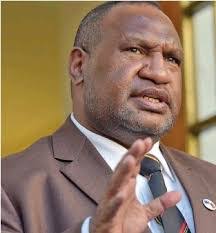-The Papua New Guinean prime minister’s office has taken out a full page advertisement in the country’s two major newspapers urging journalists to stop calling and texting him directly.
“This circular is to advise all members of the media fraternity, both national and international, that the Prime Minister James Marape MP will no longer accept direct press enquiries from the date of this correspondence onwards,” said the public notice published in the Post Courier and the National on Friday.
The notice went on to say that all questions, enquiries and requests for interviews should be submitted in writing to the prime minister’s media office, with email addresses and phone numbers listed in the advertisement.
“The prime minister has been accommodating and has responded openly to our media ever since he took office in 2019,” the notice continued. “We would like to continue this partnership by streamlining your queries to our relevant ministries.”
It is standard in many countries for journalists to have to submit questions to politicians’ offices to receive comment for stories, though journalists will often contact politicians privately for off-the-record comments.
The notice from the prime minister’s office was also sent to political reporters in the country in a WhatsApp group they have with the prime minister’s media team, along with instructions for journalists to “work for the good of our country” and “support the PM”.
The announcement divided the group, with some arguing it was an attack on press freedom, while others said it was standard practice under other leaders and that “being a [journalist] does not give you the right to go straight to the PM and text him as your friend.”
In answer to questions from journalists, the prime minister’s media officer said the notice came at “the prime minister’s direction. Please respect his call.”
One of the prime minister’s media officers warned the group that if the notice was not respected, the government would respond by limiting access to the prime minister’s press conferences to just one political reporter from each news outlet.
“We are all in this game. It’s our country and we need you,” the officer wrote. “Media, you make or break leaders and paint either a good or bad image of your and our children’s nation. We all work for the good of our country. Let’s not get that wrong … support the PM. Take back PNG for us all.”
“Absolutely there are concerns about what does this mean for press freedom,” said Kate Scheutze, Pacific researcher for Amnesty International, said the comments from the prime minister’s press officer raised “concerns about what does this mean for press freedom”.
“It is concerning for them to be saying that ‘you should be supporting our vision for the country’ because that’s not what media freedom is.”
“It falls within a broader pattern of trends across the Pacific, where governments look to extremely restrictive responses to criticism,” she said.
The notice comes as there have been concerns about limitations placed on press freedom in the Pacific.
In May, journalists covering the Chinese foreign minister’s visit to the region said they were blocked from events. Pacific journalists were not permitted to ask questions of the Chinese foreign minister, despite him touring eight countries.
In August, the Solomon Islands’ government announced that the Solomon Islands Broadcasting Corporation (SIBC), a public service broadcaster, would be brought under government control, with a government representative vetting news before broadcast and that suggested foreign media could be banned from the country.
Marape’s office was contacted for comment via email.
SOURCE: THE GUARDIAN/PACNEWS













